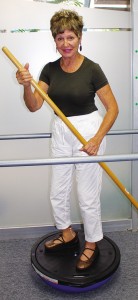 Statistics show that a majority of U.S. patients who require an amputation are age 65 and older. Amputation will likely intensify feelings of dependency, depression and helplessness: I’m too old now to learn to live without a limb. Who cares anyway? Who knows how many years I have to live?
Statistics show that a majority of U.S. patients who require an amputation are age 65 and older. Amputation will likely intensify feelings of dependency, depression and helplessness: I’m too old now to learn to live without a limb. Who cares anyway? Who knows how many years I have to live?
Limb loss is a serious challenge, and the more flexible and open-minded you are, the more quickly your body will heal and your lifestyle will adjust.
A positive outlook and hard work can improve one’ recovery. Take 71-year-old Paula Harris, who was struck in a crosswalk by a truck and lost part of her right foot.
“I have always been self-sufficient and it definitely took the wind out of my sails at first,”she said. “Anxiety and thinking I’ never walk again started to go away as soon as I began physical therapy. I found a PT who listened to all I was dealing with. Her encouragement and coaching kept my eye on the prize of walking again.”
Paula’s sense of purpose motivated her to stay active and mobile. She looked beyond her age and pushed herself to higher levels of rehabilitation —driving, dancing and golf. If you are aging with limb loss, a new amputee or a caregiver, I hope Paula’s story will inspire you.
Moon Physical Therapy, LLC
320 Ward Avenue, Suite 107, Honolulu, HI 96814
Aquatic, Land-based and Manual Therapy and
Cardiopulmonary Rehab Programs
808-597-1005 | www.moonpt.com


Leave a Reply